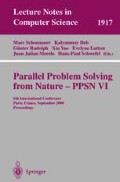Abstract
In the study of the evolution of altruism two possible mechanisms have been distinguished. One is reciprocal altruism, the other is kin selection. This paper focuses on altruism based on kin selection in environments in which there is little migration of individuals (“viscous populations”). Two simulations show that the evolution of evolutionarily stable non-reciprocal altruism is possible in societies with limited dispersal, confirming earlier research [1]. It has been questioned, however, whether these conditions occur in natural situations. This paper demonstrates that if the tendency to migrate is itself represented as a gene controlled by an evolutionary process, a tendency not to migrate evolves among altruists. Thus, the conditions which would allow the evolution of altruism are not merely a matter of coincidence, but are actively selected for, increasing the likelihood that it will be present in natural situations.
Access this chapter
Tax calculation will be finalised at checkout
Purchases are for personal use only
Preview
Unable to display preview. Download preview PDF.
References
Hamilton, W.D.: The gentical evolution of social behavior. I, II. Journal of Theoretical Biology. Vol. 7. (1964) 1–52.
Williams, G. C: Adaptation and Natural Selection. Princeton Uni Press, Princeton (1966).
Wilson, D. S., Sober, E.: Reintroducing group selection to the human behavioral sciences. Behavioral and Brain Sciences, Vol. 17. Cambridge University Press (1994) 585–654
Axelrod, R., Hamilton, W. D.: The Evolution of Cooperation. Science, Vol. 211. AAAS (1981) 1390–1396
Nowak, M. A., May, R. M.: Evolutionary games and spatial chaos. Nature, Vol. 359. (1992) 826–829
Baalen. M. van., Rand D.A.: The unit of selection in viscous populations and the evolution of altruism. Journal of Theoretical Biology, Vol. 193. (1998) 631–648.
Webb, B.: A framework for models of biological behaviour. International Journal of Neural Systems, Vol. 9. (1999) 375–381.
Brinkers, M., Den Dulk, P.: The Evolution of Non-reciprocal Altruism. In D. Floreano, J.-D. Nicoud, F. Mondada (Eds.), Advances in Artificial Life (pp. 499–503). Berlin: Springer (1999).
Maynard Smith J.: The Evolution of Behavior. The Scientific American, Vol. 239 (1964) 176–192
Author information
Authors and Affiliations
Editor information
Editors and Affiliations
Rights and permissions
Copyright information
© 2000 Springer-Verlag Berlin Heidelberg
About this paper
Cite this paper
den Dulk, P., Brinkers, M. (2000). Evolution of Altruism in Viscous Populations: Effects of Altruism on the Evolution of Migrating Behavior. In: Schoenauer, M., et al. Parallel Problem Solving from Nature PPSN VI. PPSN 2000. Lecture Notes in Computer Science, vol 1917. Springer, Berlin, Heidelberg. https://doi.org/10.1007/3-540-45356-3_45
Download citation
DOI: https://doi.org/10.1007/3-540-45356-3_45
Publisher Name: Springer, Berlin, Heidelberg
Print ISBN: 978-3-540-41056-0
Online ISBN: 978-3-540-45356-7
eBook Packages: Springer Book Archive

